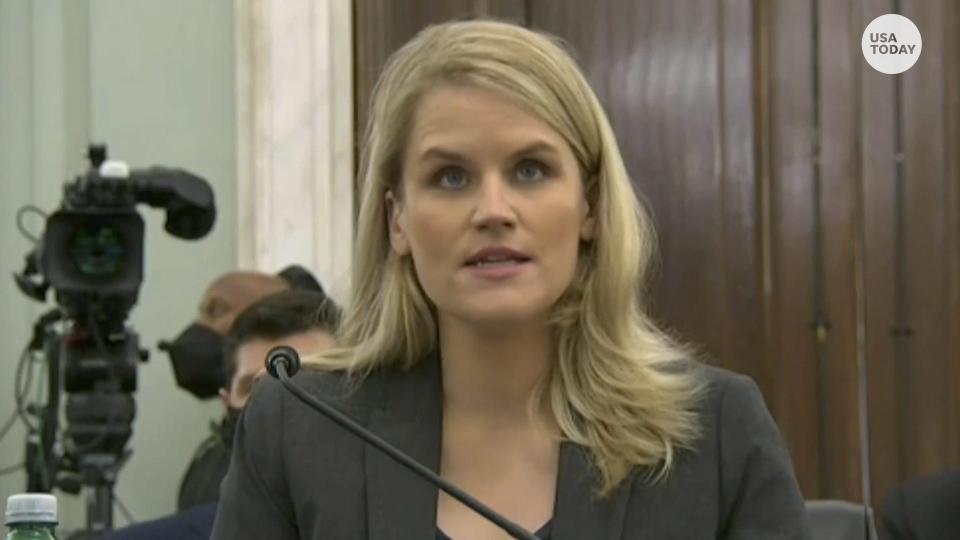'Profits before people': After Facebook whistleblower Frances Haugen argued her case, will Congress act?
Facebook did not have a seat at one of the most explosive congressional hearings in its scandal-plagued history.
Alone at the witness table was a former insider who stood up to one of the world’s largest and most powerful companies, in an effort to bring Facebook and CEO Mark Zuckerberg to public account.
Armed with tens of thousands of pages of internal documents, whistleblower and former Facebook product manager Frances Haugen testified before the Senate Commerce Subcommittee on Consumer Protection on Tuesday, warning lawmakers that Facebook has repeatedly misled the public about how its apps drive division and harm users, especially children.
►Facebook's Mark Zuckerberg: CEO breaks his silence as Congress demands answers after whistleblower testimony
►Who is Frances Haugen? Everything you need to know about the Facebook whistleblower
“The company’s leadership knows how to make Facebook and Instagram safer but won’t make the necessary changes because they have put their astronomical profits before people,” she told lawmakers.
Facebook strongly disagreed with her testimony but concurred on one point: New rules for social media are long overdue.
“It is time for Congress to act,” Lena Pietsch, Facebook's director of policy communications, said in a statement to USA TODAY.
But will it?
During the hearing, lawmakers frequently mentioned individual bills they have introduced. They have publicly called for greater oversight for years but have yet to agree on a single bipartisan proposal to more tightly regulate social media.

Though Washington has been slow to act on issues including antitrust, privacy, data portability and algorithmic bias among tech giants, regulators in the European Union have passed laws cracking down on Big Tech.
Sen. Amy Klobuchar, D-Minn., claimed lobbying by Facebook and other tech companies prevented lawmakers from passing legislation to protect consumers.
“We have not done anything to update our privacy laws in this country, our federal privacy laws. Nothing, zilch, in any major way. Why? Because there are lobbyists around every single corner of this building that have been hired by the tech industry," she said.
Lobbyists have probably contributed to lawmakers not reaching consensus on what to do about Facebook and Big Tech, but "Congress has trouble working out solutions to tech problems, in general," said David Yoffie, a professor of international business at Harvard Business School.
Legislation is something Congress "has not been very efficient at doing for a period of time," he said.
Tuesday's panel, convened to examine data from Facebook researchers that found that Instagram can harm young users, especially girls, centered on an issue that resonates on both sides of the aisle.
Facebook has tried to downplay the negative effects on teens' health and body image, from eating disorders to suicidal thoughts.
“Here’s my message for Mark Zuckerberg: Your time of invading our privacy, promoting toxic content and preying on children and teens is over. Congress will be taking action,” Sen. Ed Markey, D-Mass., said during the Senate hearing.
The conditions may be coming together for Congress to act, said Scott Shackelford, associate professor of business law and ethics at the University of Indiana in Bloomington, Indiana.
“I can’t remember this much pressure from this many different directions coalescing all at the same time, questioning their core business model (and) their impact not only on our democracy but also on teenagers and even tweens using Instagram,” he said.
It could be “a breakthrough internally at Facebook itself, which might be the most likely outcome in the near term,” Shackleford said.
Legislation is a possibility, he said, “given there are very few defenders of Facebook on Capitol Hill these days, they finally get their act together and finally pass some reform legislation.”
Tuesday marked Haugen's first public appearance after revealing on CBS News' "60 Minutes" on Sunday night that she was the source of Facebook internal research leaked to The Wall Street Journal.
She urged Congress to regulate Big Tech the way it does Big Tobacco, cars and opioids but to "break out of previous regulatory frames" because there is so little public visibility into how Facebook operates.
►Are you over Instagram? How to delete or deactivate your Instagram account.
►Better than MacBook?: Microsoft's new Surface Laptop Studio has a very Apple feel
The company cast Haugen as a former employee with limited experience who testified on subjects she knows little about. Before working at Facebook, Haugen, a 37-year-old from Iowa with a degree in computer engineering and an MBA from Harvard, spent 15 years at other tech companies, including Google and Pinterest.
“Today, a Senate Commerce subcommittee held a hearing with a former product manager at Facebook who worked for the company for less than two years, had no direct reports, never attended a decision-point meeting with C-level executives – and testified more than six times to not working on the subject matter in question," Pietsch said. "We don’t agree with her characterization of the many issues she testified about."
Haugen said she does not think Facebook set out to build dangerously addictive and destructive products, but the company, which owns Instagram, WhatsApp and Facebook Messenger, lacks checks and balances.
“There is no one currently holding Mark accountable but himself," Haugen said, referring to Zuckerberg who controls more than 50% of Facebook's voting shares.
"I came forward at great personal risk because I believe we still have time to act, but we most act now," she told lawmakers. "I am asking you, our elected representatives, to act."
This article originally appeared on USA TODAY: Facebook whistleblower asks Congress to regulate Big Tech

